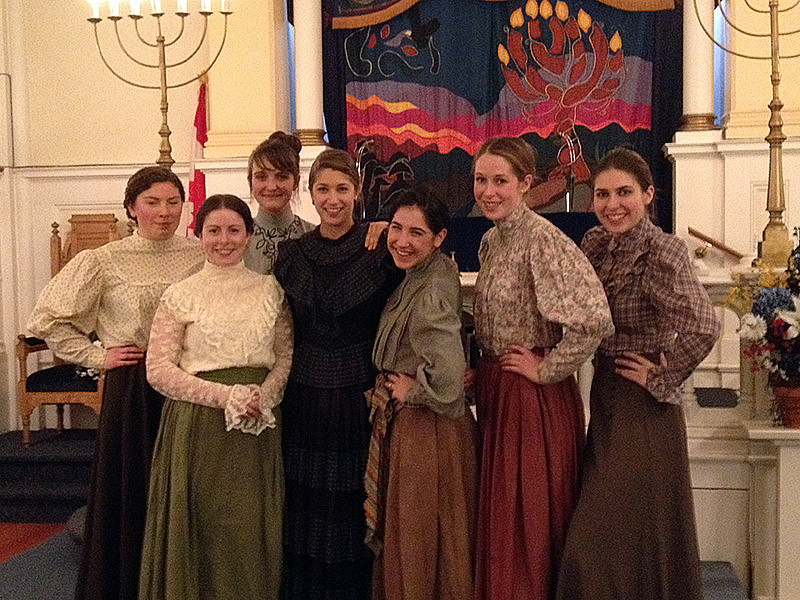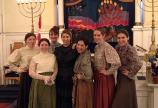Community collaboration rediscovers a female rabbi
- Adrienne Holierhoek

Site-specific play celebrates two anniversaries, brings historical research and momentous event to life
For one spectacular evening this April, Canada’s oldest synagogue in downtown Victoria played host to a performance that was itself a shining example of how creative community-based research can bring people together. And in the writing and development of the play, a trove of forgotten history was uncovered about sensational events that brought a young woman to head Congregation Emanu-el’s then-Orthodox synagogue during the 19th century.
Celebrating two anniversaries, collaboratively
When Zelda Dean of Victoria’s Congregation Emanu-El first contacted UVic’s VP Academic and Provost, Dr. Reeta Tremblay, her hope was for the two institutions to collaborate on a project to celebrate their respective anniversaries: UVic’s 50th and Congregation Emanu-el’s 150th.
Dr. Jennifer Wise, Associate Professor in the Department of Theatre, suggested a play about a little-known but remarkable event in the Congregation’s history: in 1895, Miss Ray Frank was invited to officiate over the High Holidays as rabbi of what was then an Orthodox synagogue. The congregation was intrigued by the idea. Wise got to work. A year later Wise’s play, Ray Frank: The Girl Rabbi of the Golden West, was ready for performance.
Wise is no stranger to playwriting. In 2009 she a wrote a similarly history-based play about Galileo’s family, The Moons of Jupiter, for the International Year of Astronomy; her translation of Brecht’s The Resistible Rise of Arturo Ui was published by Methuen this month.
Research reveals amazing connections
Wise conducted most of her research at the American Jewish Historical Society Archives in New York City. There she read the letters, essays, and speeches of Ray Frank, an educated, California-born daughter of Polish immigrants. Frank’s eloquence made her a popular speaker on subjects from Biblical history to philosophy and aesthetics. Wise discovered not only that Frank’s two-week-long leadership of the synagogue was a historic first, but also that her impact on the people of Victoria, and Canada, was significant.
The most dramatic example of this was found in letters written by Samuel D. Schultz to Frank after her visit. Schultz, a Victoria lawyer, went on to become Canada’s first Jewish judge and credits Frank with turning his life around. Wise quotes his letter in the play: “You pricked my slumbering ambition into an ardent desire to live my life for all it was worth. …I have been frittering away my energies in countless directions—but now Law must have my every thought.”
“Once I found those letters,” said Wise “all the pieces started falling in place and I realized that this play is about the effect Ray Frank had on the congregation and the people of Victoria.”
She also learned that while in Victoria, Frank gave a public lecture on art and nationality. “She told Canadian artists to look to the forests, like those around Goldstream, an area she visited,” said Wise. “Anyone with any cultural aspirations in Victoria in 1895 would likely have been at this talk.” Given the subject matter, Frank’s audience may even have included Emily Carr, who did indeed go on to make the British Columbia forests a subject of her art.
Other documents revealed how Frank empowered the women of the congregation. The synagogue’s meeting hall – which the Hebrew Ladies Association raised all the funds to build, but rented annually from the all-male Board of Directors – was soon put under the Ladies’ control. Wise explored the feminist influence of Frank’s visit by writing the play for an all-female cast of seven actors who, in full view of the audience, change hilariously into the men of the congregation in alternating scenes.
Community re-enacts a historic moment
The real magic of the play was revealed in April during its sold-out site-specific performance inside the synagogue – exactly where the events themselves occurred in 1895. Toronto-based director Liza Balkan took full advantage of the historic venue, moving the action all around the sanctuary, up into the second-floor galleries, and onto the bimah, or pulpit.
“It’s an outstanding piece of theatre and we are so grateful to Jennifer for her vision and determination to create and offer this work to our Victoria community,” said Isa Milman, the Chair of the Jewish Arts committee for their 150th Anniversary. “It was an experience that educated us, lifted our spirits, made us laugh and cry and thrilled us, as we experienced all within the very room where the events took place.”
For Wise, the research not only gave fitting tribute to one exceptional 19th-century woman—but gave all the play’s participants an actual experience of Ray Frank’s inspiring community vision.

